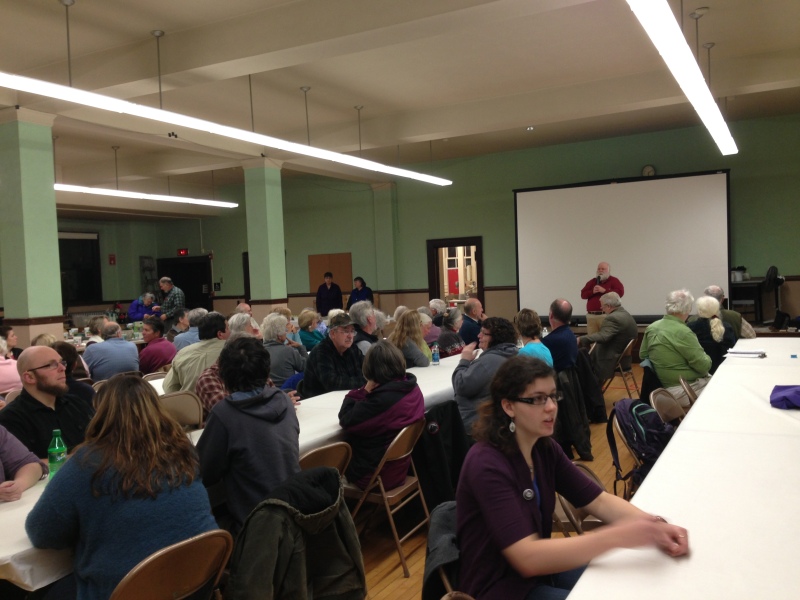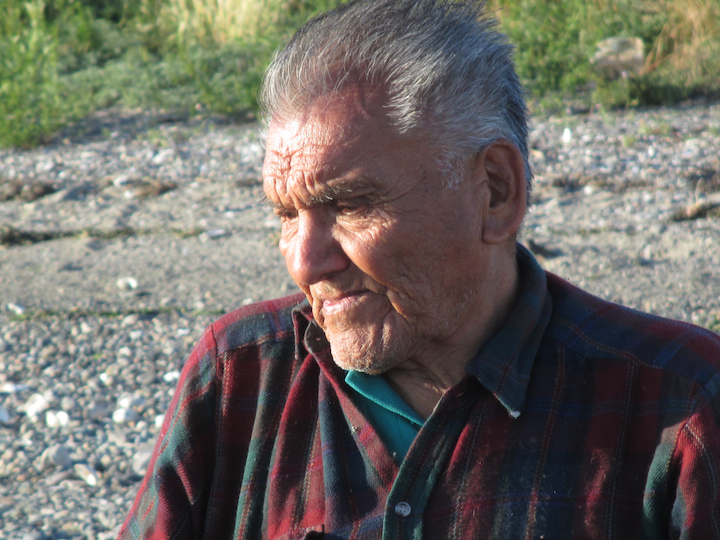JUST WHEN YOU THOUGHT NOBODY CARES…
November 13, 2014
Take a look at this the next time you feel like people don’t care about nature. Here’s the local Athol Bird and Nature Club, in Athol, MA, at their meeting last night. More than 200 people turned out to a share a simple dinner (iceberg lettuce salad, bottled Italian dressing, lasagna home-cooked in aluminum pans, chicken breasts plumped with instant stuffing.) There was a silent auction table with items ranging from a bag of mini-Snickers bars to a home-made tray with a red-bird cardinal painted on it. Then came the highlight of the night, a slide show about black bears.

A big turnout at the Athol Bird and Nature Club. Standing is Dave Small, volunteer president for the past 25 years.
Here’s what touched me. The turnout. Athol is a classic depressed New England mill town that last saw its best days economically long ago. A lot of people there live hard lives. And yet the Athol Bird and Nature Club thrives. Grandmothers, kids, parents, the Millennials we keep getting told only care about their electronic devices…they all turned out. And it’s not the first time. Back this fall, the club put on a day-long wild mushroom festival that had people spilling out of the building and onto the lawn, eager to identify the mushrooms gathered from the local woods and spread out on tables for all to see.
That’s not all. The town also in December, 2013, completed an $8.6 million renovation and expansion of its 1918 Carnegie library. Its gracious spaces and soaring windows would be the envy of any town. According to the story in the Worcester Telegram and Gazette by reporter George Barnes, town voters approved the renovation in 2010, despite the worst economic downturn since the Great Depression, and before they knew they would get state funding to help.
Last night was my first meeting with the club, which recently celebrated its 50th anniversary. I met the most wonderful people. As I stood in line for my lettuce and lasagna with chopped carrots and oddly white sauce ($10 donation per head) I asked the woman next to me in line what interested her, why was she here? I loved her answer: “I want to know what’s around me.” What better reason is there? People I talked to were into everything! Dragonflies. Moths. Geology. Stars.
I took my paper plate to my table — you can picture the setting can’t you? Long folding tables end to end, metal folding chairs, fluorescent lighting, all in a basement function room at city hall. Seated next to me were four young women recently moved to small towns in the area, each doing public service with AmeriCorps, from helping teachers provide hands-on nature instruction, to working to help communities re-start local food supply systems. Each had uprooted themselves to move to small town New England for a year, and live on tiny wages out of an impulse to give big.
When I left after two hours the club was still cranking. Dinner finished and slide show over, next to come was the q & a about black bears, and social time. Who knows how late they went!
I walked out into a cold, starry night feeling wonderful about these people, their love of nature, and care for their place on our planet.
Others who inspire me
October 21, 2014
Here are links to some things I enjoy….
Teachings of the Tree People
This documentary captures some of the teachings of the late subiyay Bruce Miller, one of the most important traditional spirit leaders of the Skokomish people, in Puget Sound Country. In this video, subiyay explains the teachings of the Tree People, and role of trees as mentors to we two-leggeds.

And…beyond trees:
My friend, writer David Laskin of Seattle who just won the Washington State Book Award for the fourth time, and deservedly so, for his most recent tour de force, The Family. The humanity of David’s voice, thoroughness of his scholarship and writing finesse are a Mount Rainier of inspiration in our regional literary world of the Northwest…and beyond.

The Washington Native Plant Society. Discover a new plant today! If you know your plants, you know your place!
The View From Forever
October 18, 2014
Hurricane Hill is an astounding hike along Hurricane Ridge at Olympic National Park, outside Port Angeles, Washington. Special for me there is the sight of the source of the Elwha River, plunging in a plume of white water off the glaciered sides of Mount Olympus.
For the first time in more than 100 years, the Elwha River is once again free flowing, after completion of the largest dam removal project ever anywhere in the world, to restore the watershed from the mountains to the sea. The $325 million effort, approved by Congress in 1992, took decades to bring about, and the courage of many conservationists and especially the Lower Elwha Klallam Tribe, the native people of this place who got the least from the hydroelectric dams, and paid the most, in the loss of the salmon runs in the river that had sustained them for millennia.
Taking out the dams opened 70 miles of spawning habitat to ocean going salmon and steelhead trout for the first time in a century. To open so much habitat with one action is very unique. To learn more about the restoration, read my stories in the Seattle Times.
Roy Edward, master Coast Salish canoe builder
October 15, 2014
The late Roy Edward, 85, was a native elder from Kuper Island, BC, and a master canoe builder.
He attended the Stommish water festival at the Lummi Indian Reservation every year, where I
caught up with him two summers ago, enjoying the canoe races. Roy carved many of the fastest canoes in Indian Country today, all by hand.
His largest canoes hold 12 paddlers, and are true ocean-going craft. He splits a log into halves, using a sledgehammer and wedges, then fashions a canoe from each half. The craft of canoe making was taught to him by master carvers.
“It wasn’t written,” Edward
said of the instruction for carving. Instead, he said, tapping his heart, “It’s all here. Wood for the canoes came from Mount Shuksan in the Cascade Range, looming in a vast, white dome over the waters of the Lummi Reservation.
“The old people couldn’t read and write. But they were smart.”
The canoes are carved narrow at the front, wide in the middle, and taper at the back, to
slip through the water.




